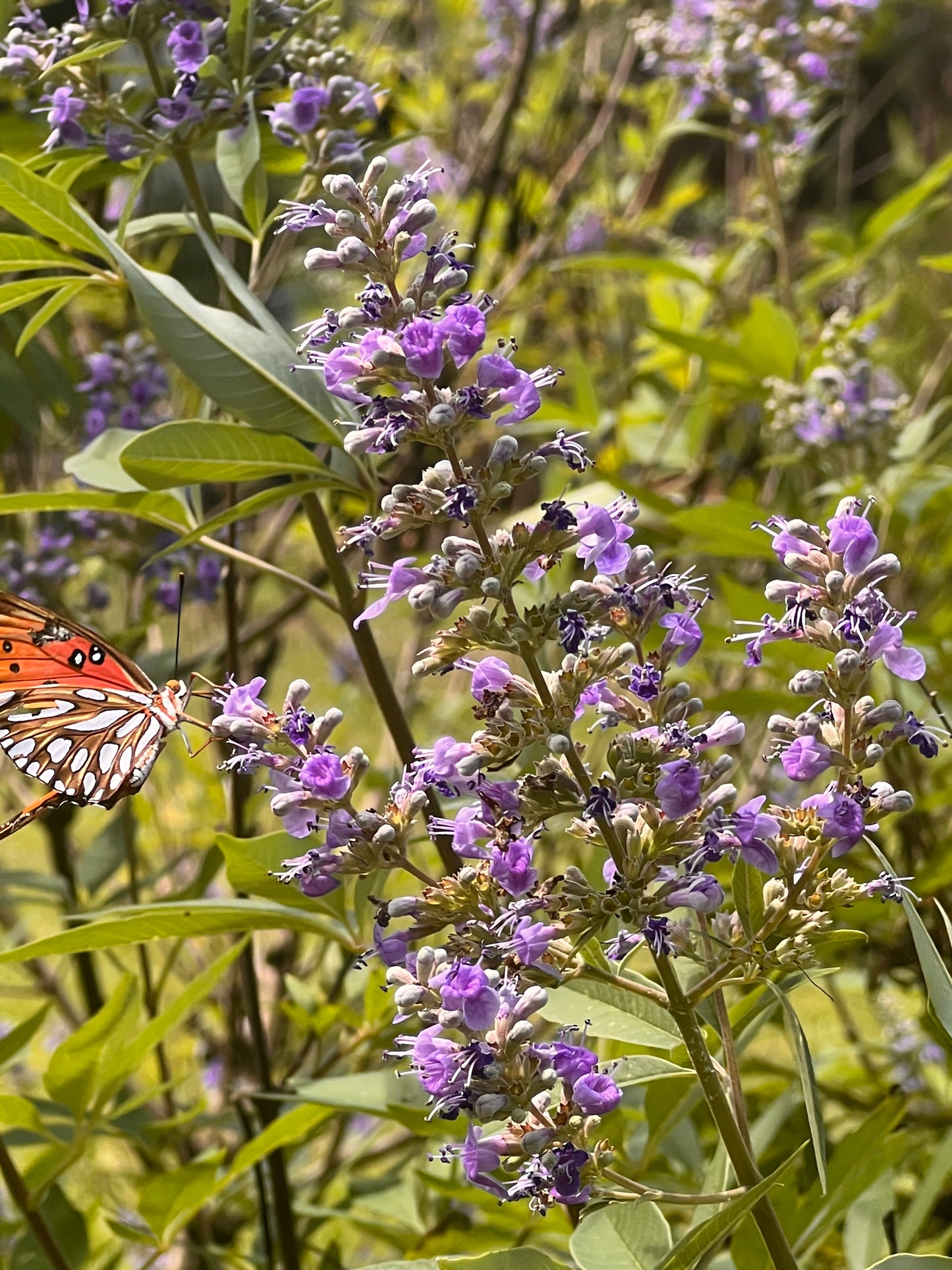Vitex spp.
Vitex spp.
Vitex, commonly known as chaste tree, monk's pepper, or simply Vitex (_Vitex spp._), is a deciduous shrub or small tree known for its aromatic, palmate leaves and long, showy spikes of purple, lavender, or white flowers that bloom in late spring to early summer. The flowers are highly attractive to pollinators, especially bees, butterflies, and hummingbirds. The plant also produces small, peppercorn-like fruits, which have been historically used in herbal medicine.
Grow Zone:
- USDA Hardiness Zones: 6-9.
- In colder zones, Vitex may die back to the ground in winter but usually regrows in the spring.
Height and Width:
- Height: Typically grows 10 to 15 feet (3 to 4.5 meters) tall but can reach up to 20 feet (6 meters) in warmer climates.
- Width: Spreads about 10 to 15 feet (3 to 4.5 meters) wide, forming a broad, rounded shape.
Uses:
- Ornamental: Ideal for use as a specimen plant, in mixed borders, or as part of a pollinator garden due to its colorful blooms.
- Medicinal: Historically used for its fruit, known as "chasteberry," which has been used in herbal medicine to address various hormonal issues.
- Hedges and Screens: Can be planted in groups to create a flowering hedge or privacy screen.
- Erosion Control: Its deep roots can help stabilize soil on slopes or in erosion-prone areas.
Native Range:
- Native to the Mediterranean region, including parts of Southern Europe and Western Asia.
- It has become naturalized in many parts of the southern United States.
Light:
- Full Sun: Prefers full sun, which encourages the best flowering and growth. It can tolerate some light shade but may bloom less profusely.
Soil:
- Well-Draining Soil: Thrives in well-draining soil, whether sandy, loamy, or even clay with good drainage.
- Soil pH: Adaptable to a range of soil pH, from slightly acidic to slightly alkaline (pH 6.0 to 8.0).
Watering:
- Drought-Tolerant: Once established, Vitex is quite drought-tolerant and does not require frequent watering.
- Watering Needs: Water regularly during the first growing season to establish a strong root system. Afterward, water only during prolonged dry spells.
Temperature:
- Cold Tolerance: Can withstand temperatures down to -10°F (-23°C) in colder zones, though it may die back in winter.
- Heat Tolerance: Performs well in hot, dry climates typical of its Mediterranean origins.
Fertilization:
- Minimal Fertilization: Vitex generally requires little to no fertilization if planted in reasonably fertile soil.
- Optional Feeding: A light application of a balanced fertilizer in early spring can encourage more vigorous growth and blooming.
Pruning:
- Encourage Blooming: Prune in late winter or early spring before new growth begins to stimulate bushier growth and more blooms.
- Shape Control: Prune back to control size and shape, especially if grown as a hedge or small tree.
- Deadheading: Removing spent flower spikes can encourage a second round of blooming in some climates.
Pests & Diseases:
- Generally Pest-Free: Vitex is relatively resistant to pests and diseases.
- Occasional Issues: May occasionally face issues like leaf spot or root rot in poorly draining soils, but these are rare.
Uses in Landscape:
- Specimen Plant: Ideal as a focal point in the garden due to its striking flowers.
- Mixed Borders: Can be combined with other shrubs and perennials in a mixed border to provide height and structure.
- Wildlife Gardens: Attracts bees, butterflies, and other pollinators, making it a great addition to wildlife-friendly gardens.
Cultural Significance:
- Historical Use: The seeds of Vitex agnus-castus have been used for centuries in traditional medicine, particularly in Europe, for their supposed effects on female reproductive health.
---SHIPPING NOTICE PLEASE READ BEFORE PURCHASING LIVE PLANTS!---
We WILL NOT refund the purchase of or the shipping cost of live plants purchased with the intent to be shipped to states that do not authorize importing live plants or to states with restrictions! Purchases to these states will be held for 30 days for pick-up at our Slidell, Louisiana store and the shipping cost associated with these purchases will be held for the care of the plant while waiting to be picked up. All sales are final. If the plant(s) purchased are not picked up within 30 days from the date of order, these items will be returned to our sales inventory and you WILL NOT be refunded. Thank you for understanding these policies.
Due to regulations, certain states have restrictions on importing plants. Please review the list below to ensure you're not attempting to order any restricted plants in your area.
**Important Note:** We do not ship any plants outside the U.S.
State-Specific Restrictions - We ARE NOT responsible for any plant(s) that are not listed in these restrictions. Purchaser bears all responsibility for making sure the plant(s) they desire to purchase are not banned from being imported to the shipping state:
Arizona: Juglans spp.
California: Castanea spp., Juglans spp., Pinus spp., Quercus spp.
Colorado: Some counties restrict Prunus spp. Please verify your local county regulations.
Florida: Castanea spp., Cornus spp., Quercus spp., Cornus mas
Georgia: Vaccinium spp.
Hawaii: Pinus spp.
Idaho: Humulus lupulus, Mentha spp., Vitis spp.
Indiana: Fragraria spp., Rosa spp.
Kansas: Juglans spp.
Michigan: Abies spp., Vaccinium spp.
Montana: Pinus spp.
Nevada: Allium spp.
Mentha spp.
New Jersey: Rosa spp.
New York: Vitis spp.
Oregon: Allium spp., Castanea spp., Corylus spp., Humulus lupulus, Quercus spp., Sambucus nigra, Ulmus spp., Vaccinium spp., Vitis spp.
Texas: Juglans spp.
Washington: Allium spp., Castanea spp., Corylus spp., Humulus lupulus, Vaccinium spp., Vitis spp.
Wisconsin: Abies spp., Pinus spp., Picea spp., Mentha spp.
Additionally, we cannot ship plants in soil medium to the following states: AK, AL, AR, AZ, CA, HI, ID, KS, MS, MT, ND, NM, NV, OK, OR, SD, TX, UT, WA.
Couldn't load pickup availability


